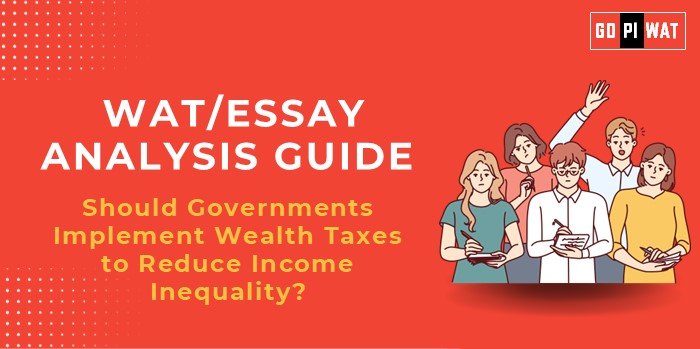📋 WAT/Essay Analysis Guide: Should Governments Implement Wealth Taxes to Reduce Income Inequality?
🌐 Understanding the Topic
Wealth taxes aim to reduce income inequality by taxing the wealthiest individuals. While proponents highlight their role in redistribution, critics point to challenges like tax evasion, high costs, and economic distortions.
📝 Effective Planning and Writing
- Time Allocation:
- ⏱️ Reading & Planning: 5 minutes
- ✍️ Writing: 20 minutes
- 🔄 Review: 5 minutes
- Word Count Distribution:
- 📜 Introduction: 70 words
- ✍️ Body: 360 words
- 📄 Conclusion: 70 words
💡 Introduction Techniques for Essays
- Contrast Approach: “While the top 1% controls 45.8% of global wealth, millions lack basic necessities, highlighting the need for equitable taxation policies.”
- Historical Perspective: “Wealth taxes have seen mixed success globally, with countries like France abandoning them, while Switzerland thrives on a well-implemented model.”
📊 Structuring the Essay Body
- 🏆 Achievements:
- 🌍 Norway: Efficient wealth tax system balances revenue generation with minimal economic disruption.
- 📚 Spain: Utilized wealth taxes to fund essential sectors like education and healthcare.
- ⚠️ Challenges:
- 💸 Offshore tax evasion significantly diminishes potential revenue.
- 📉 High administrative costs deter broader adoption of wealth taxes.
- 🔮 Future Outlook:
- 💻 Leverage international collaborations for digitized wealth tracking and transparency.
- 🌐 Encourage global harmonization to combat tax avoidance and enhance compliance.
📄 Concluding Effectively
- Balanced Conclusion: “Wealth taxes can bridge inequality gaps if implemented with transparency, global cooperation, and robust enforcement measures.”
- Solution-Oriented Conclusion: “Effective wealth taxes require digital tools and international frameworks to ensure compliance and maximize revenue potential.”
🔍 Analyzing Successes and Shortcomings
- 🏅 Key Achievements:
- ✔️ Norway and Switzerland showcase balanced wealth tax models that generate revenue effectively.
- 💰 Wealth taxes fund critical public services, reducing wealth disparities.
- ⚠️ Ongoing Challenges:
- 🔐 Offshore tax evasion undermines the effectiveness of wealth taxes.
- 📜 Economic criticisms argue that wealth taxes deter investment and slow growth.
- 📊 Limited administrative capacity creates inefficiencies in tax collection.
🌱 Recommendations for Sustainable Progress
- 💻 Digital Wealth Tracking: Leverage technology to enhance transparency and monitor assets more effectively.
- 🤝 Global Cooperation: Establish international frameworks to harmonize tax policies and address offshore evasion.
- 📈 Public Awareness: Foster trust in wealth tax systems through transparent communication and equitable enforcement.
✍️ Sample Short Essays
- Balanced Perspective: “Wealth taxes, though fraught with challenges, can address inequality if global tax evasion is curbed.”
- Solution-Oriented: “Collaborative international efforts and digitized systems can make wealth taxes an effective tool for redistribution.”
- Global Comparison: “Switzerland’s success with wealth taxes demonstrates their potential when complemented by trust in governance and transparency.”


